
Twenty years ago today, on August 29, 2005, Hurricane Katrina roared ashore in southeastern Louisiana, tearing through the Gulf Coast with catastrophic force and gushing winds, driving a massive storm surge toward New Orleans. Thousands were abandoned by state and federal officials, left to fight for survival in the rising floodwaters — many stranded on the rooftops of their sinking homes without water, food or medical care. The storm and its aftermath are the focus of the acclaimed new documentary series, Hurricane Katrina: Race Against Time. It offers an historical record of Hurricane Katrina and its aftermath and examines how it was a catalyst that revealed preexisting systemic failures. Democracy Now! speaks with the film’s Academy Award-nominated director, Traci A. Curry.
Transcript
NERMEEN SHAIKH: Well, we spend the rest of the hour looking at the devastation in the aftermath of Hurricane Katrina. Today, 20 years ago, on August 29th, 2005, Katrina roared into southeastern Louisiana, tearing through the Gulf Coast with catastrophic force and gushing winds, driving a massive storm surge toward New Orleans. Thousands of residents were abandoned by state and federal officials, left to fight for survival in the rising floodwaters, many stranded on the rooftops of their sinking homes without water, food or medical care. Efforts by community members to rescue their neighbors laid bare the resilient spirit of New Orleans amidst what became one of the deadliest hurricanes in United States history.
That’s at the heart of a riveting five-part documentary series by National Geographic released just last month called Hurricane Katrina: Race Against Time. This is the series trailer.
VOICE ON NEWS: If you’re still hearing us and you haven’t left yet, please leave. I hate to say this, but I just don’t have enough body bags.
LUCRECE PHILLIPS: The calmness before a storm is deafening.
IVOR VAN HEERDEN: As Hurricane Katrina was approaching, we knew this was going to be a catastrophe.
SHELTON ALEXANDER: I didn’t want to leave, because I didn’t know what we was going to be coming back to. I just was praying.
TIM BAYARD: People don’t realize how big Katrina was.
PAUL HELLMERS: It’s too big to turn. It’s gonna hit us.
EDDIE COMPASS: This is not a normal hurricane. Something’s wrong.
JOSEPH FINCHER: Then my heart just sank. We have a breach in the levee.
SHELTON ALEXANDER: We have rain inside the Superdome. I repeat: rain inside the Dome.
FLOOD SURVIVOR: In three minutes, it went from the ground to the roof.
SALLY FORMAN: A lot of people suffered, and a lot of people suffered needlessly.
SURVIVOR: Just let me know y’all are living, you hear me?
SHELTON ALEXANDER: People coming out of one bad situation, but they didn’t know they was coming to another hell.
SALLY FORMAN: We expected FEMA to come in, but there was no help.
TIM BAYARD: I told the guys, “Go find whatever boat you can find.” We went and did what we had to do to try to save people’s lives.
LYNETTE BOUTTE: This community was not wanting to go out and just loot. Those people were trying to survive.
SURVIVOR: You got a government. What is they doing? This is serious!
RUSSEL HONORÉ: That’s not something you ever want to do, is tell the troops to shoot civilians. Governor, that’s your people.
KEVIN GOODMAN: They just let us down. To them, we wasn’t even human no more. But people from New Orleans, we knew how to survive.
JOHN KELLER: And this is supposed to be the greatest country on the planet.
MALIK RAHIM: In order to prevent something, you got to understand why it happened in the first place.
AMY GOODMAN: For more, we’re joined by Traci A. Curry, the Academy Award-nominated director of this acclaimed new documentary series by National Geographic, Hurricane Katrina: Race Against Time. All episodes are now streaming on Disney Plus and Hulu. Traci Curry is also the co-director and producer of the Oscar-nominated documentary Attica with legendary filmmaker Stanley Nelson.
Traci, welcome to Democracy Now! It is truly astounding, this documentary series. I watched it on Hulu just a few days ago. It was a beautiful day in New York. By the end of it, I thought it was raining. I thought the waters were rising, this inexorable move toward disaster. You have captured something like I’ve seen no one else capture it. And I wanted you to start off by talking about the systemic failure. This isn’t just a natural disaster of the rising waters. This is an absolutely catastrophic government failure. If you can talk about, well, everything leading up to it, and the level that racism played in the response to those who suffered and died, almost 2,000 people?
TRACI CURRY: Yeah, Amy, first of all, thank you for having me. It’s such a pleasure to be here.
I think one of the things that we really wanted to show in the film is that it really wasn’t the storm itself, that the storm, in fact, was sort of a catalyst that revealed and exacerbated, as you said, all of these sort of preexisting systemic and structural failures that had actually been failing people long before the storm ever came. And the storm comes along and sort of rips away any sort of sense that there was safety and protection for these people.
And so, part of what we tried to do with the film is every episode peels back another layer, another layer, another layer of those broken systems that failed people during Katrina. So, in the first episode, we understand that this is actually an environmental justice story and the destruction of the natural environment that caused a vulnerability for the people of New Orleans when Katrina came. Then we get into what we know is the failure of the man-made barrier, the levee system that the Army Corps, that the government was responsible for building in a way that made it vulnerable to the floods. Then we sort of pull back the media systems and institutions and how those failed people. And then we kind of pull back the state violence that people were subjected to. And from there, we sort of get into the story about housing policy. And again, preexisting racial disparities in housing policy really informed who was able to come back and recover and restore their lives after the storm.
So, really, we go into all of these many, many levels of systemic and institutional failures, that, again, preexisted the storm, but the storm comes along and exposes and exacerbates all those things to create, as we hear Malik Rahim say, a disaster that became a catastrophe.
NERMEEN SHAIKH: Well, your film, Traci, is not only very, very informative, of course, and powerful. It’s also absolutely beautifully filmed and compiled. So, let’s go — we’d like to show another clip from the documentary. Again, the title is Hurricane Katrina: Race Against Time. In this clip, we hear from Ed Bush, who was a Louisiana National Guard major during Katrina, and Shelton Alexander, a spoken word poet from St. Bernard Parish who filmed his experience sheltering inside the Superdome. His footage was weaved into the documentary.
ED BUSH: There is no comms. And since the loudspeaker system didn’t work, I walked around the 30,000 people in the Superdome to let them know, “We’re working on it. And I think it’s going to be buses, and we’re going to bring — I don’t know how it’s all going to work, but buses are coming.”
SHELTON ALEXANDER: It did uplift our spirits. And so, I was watching people settle beefs and shaking hands. You know what I mean? The place started getting real trashy. So, a lot of the teenagers, they started coming together, and they started cleaning up.
ED BUSH: There was a young man pushing around one of those hotel luggage carts with a person laying on it. And he said, “Hey, this lady just passed out. What do you want me to do with her?” And she was — she was OK, but — and she was conscious, but she was clearly overheated. And I said, “Can you roll her to the medical center? It’s right down there.” And so he took it. Then he came back about 10 minutes later. He’s like, “You want me to keep doing this, if I see stuff or any people?” And I was like, “Please do.” He loved that he had a role. The risk of allowing that young man to help push people to the medical arena was this much. The impact of other people seeing how he was helping was colossal.
NATIONAL GUARD CHAPLAIN: Let’s gather around for service. Please do so. We’ll start in a couple of minutes. Let’s gather around.
SHELTON ALEXANDER: The National Guard chaplain would talk to us, and he’ll say, “What are your concerns right now? What are you thinking?” And people just, you know, would say, “My loved ones.”
CROWD MEMBER: My loved ones.
NATIONAL GUARD CHAPLAIN: I know, your loved ones. Look, one of the things we want to focus in on is, as bad as it is, we can rebuild a house. I have no home to go to, either. Everything I have has been destroyed. I’m wearing what I have. So we’re all in the same boat. But you know what? All of my family is OK. And that is important. And that’s why we have to pray.
SHELTON ALEXANDER: New Orleans is a city that prayed. And I thought he did a great job. And he, as a man of God, stood up there, and he spoke to us, and he made us feel better.
NATIONAL GUARD CHAPLAIN: Even though we are uncomfortable, we give thanks that God sent his angel down to comfort us.
SHELTON ALEXANDER: A lot of people started feeling like, you know, now we’re chosen at this point in time.
NATIONAL GUARD CHAPLAIN: Amen.
CROWD: Amen.
SHELTON ALEXANDER: We’re in this thing together. And before we get it even worse, we’re going to get out of here.
NERMEEN SHAIKH: That’s a clip from the docuseries Hurricane Katrina: Race Against Time. The film also features stories from Katrina survivors like hairdresser Lynette Boutte. This is Boutte in her own words from the documentary.
LYNETTE BOUTTE: And so, I wanted to come back into the community and do what I had to do. And I was not going to stop until I got back to where I intended to be back in 2005. Every penny I have made since Katrina has gone into me getting back into my salon and my property. It’s mine. And like I told the people that wrote home, you will have to pry out of my wrinkled-up little brown hands to get it.
NERMEEN SHAIKH: So, Traci Curry, those are a couple of clips from your docuseries. So, if you could tell us some of the personal stories, the interviews you do with survivors, Malik Rahim, who Democracy Now! has also — Amy Goodman has also spoken to at length, and others, the personal stories you got of the hurricane and how people survived?
TRACI CURRY: Well, one of the things that I and the producers that I work with learned early on — we made some early visits to New Orleans before we ever started filming anything, really just to listen and hear what people had to say. And one of those conversations was with General Russel Honoré, who you see in the film, who sort of comes in and finally begins to kind of wrangle things so things start moving. And one of the things that he told us — and General Honoré knows Katrina better than most — is that his understanding is — of what Katrina was, is that it’s what you experienced, where you were, where you stood in it at the time. And so, that really informed our understanding, that there isn’t just a Katrina story. There are many Katrina stories, as many Katrina stories as there are Katrina survivors.
And so, what we really set out to do was to collect as many different parts and pieces of that story as we possibly could, to begin to make something that felt like a whole telling of what happened, and to center the experience of the story in the people that lived it. And so, we really set out to understand what it was to be in the Superdome, as we heard the clip with Shelton and Ed, what it was to be trapped in your attic, and we spoke to Lucrece Phillips. You played the clip from Ms. Lynette Boutte, who was stranded on the interstate highway. We spoke to someone who was inside of the Convention Center. We spoke, as you mentioned, to Malik Rahim, who, while he was across the river in a part of the city that did not flood, was experiencing racialized violence as a result of the vulnerabilities and people being exposed, and lived where there was also police violence that was happening to an unarmed man in Algiers.
So, we really tried to get as many parts of what it was, this sort of basket of experiences that we all kind of understand collectively under Katrina, that, as I said, really is not — it was the name of the storm, but really is not about the storm at all. It was about all of these other ways that the storm revealed and, as I said, exacerbated the vulnerabilities that people were living with at the time. And so, we really tried to ground that in the experience of the people who really lived it, and restore the narrative and the story to them.
AMY GOODMAN: I mean, the story of the government malfeasance. I mean, when you have the former FEMA director — right? — who famously said he didn’t realize people were in the Convention Center. I mean, so shocking when thousands of people were there, when you had — and then, of course, you think about the level of experience these people had in dealing with catastrophes, as opposed to political appointees, and the level of racism, those who got saved and those who didn’t. If you can talk about, I mean, a changed city, why this isn’t just about 20 years ago? The demographics change, with — so many African Americans left New Orleans. People didn’t even know where they were going. As they got on planes, they wouldn’t even be told. That it became a whiter city, all the teachers fired at the beginning. It was so astounding. And then it becomes a prototype for the charter school system in the United States, an entire —
TRACI CURRY: Yeah.
AMY GOODMAN: — charter system replacing the public schools, Traci.
TRACI CURRY: Yeah. And one of the things — I’m really glad that you mentioned that thing about the public school, because there are so many levels and layers to which Katrina transformed the city irreparably. And one of the things about the firing of the public school teachers is that when you think about who made up a large population of those teachers, it was Black women. And I spoke to someone who we didn’t end up putting in the film, but she was one of those teachers. And now, 20 years later, when she should be living comfortably in her retirement, she’s still having to work, because her pension, that she would have gotten as a retired teacher, was cut in half when the school system was thrown out, as were the teachers. And so, there are just all these levels and layers, that were not necessarily apparent at the time, to the ways that Katrina has just really transformed people’s lives.
We spoke, as I said, to Malik, who I know you guys know well at Democracy Now!, started this organization, Common Ground, that was doing environmental remediation work and healthcare. Another person in our series, Alice Craft, while living in a FEMA trailer, started a health clinic for people in the Lower Ninth Ward. And one of the things they tell us is that there was a huge mental health crisis. This was a profound trauma for everybody that experienced it, and there was never any sort of healing for that. And so, there are just — what you’re sort of getting at, I think, there, Amy, is just all of these sort of levels and layers of lasting harm that were done as a result of this, that I don’t think were quite apparent, and even 20 years later, I don’t think are quite apparent in how this city has been irreparably changed.
I talked early on to a lot of the people, when we were just sort of listening to what people had to say. And what they told me is that, you know, for those of us who go to New Orleans as visitors, it feels like the New Orleans that we know, or the New Orleans of our imagination. We do the Mardi Gras, the Bourbon Street, the jazz festivals. But for them, which is to say the people who are of this place and lived it, they experienced this bifurcated experience of New Orleans, that they describe as “before Katrina” and “after Katrina.” And so much of what that after was like is that these very close ties of kinship and community, that really defined life in New Orleans for the people who lived there, were rent apart by Katrina in a way that was never knit together. I mean, the people were kind of called refugees, and there was all this sort of othering language that was used to describe them. But really what they were was internally displaced people, and many of those people never, ever, ever came back. So this was just an absolutely transformative event in the lives of these people and this city, and continues to be to this day.
AMY GOODMAN: Well, Traci A. Curry, I just want to congratulate you on this series. Traci is the Academy Award-nominated director of the acclaimed new documentary series Hurricane Katrina: Race Against Time, now streaming on Disney and Hulu.
And that does it for this show. Special thanks to our local crew here in Telluride: Greg Cairns and Stash Wislocki and Patrick Dyer and Dallas Sainsbury and Denis Moynihan. Special thanks also to everyone at the Telluride Film Festival who helped make this broadcast possible and to Telluride’s community radio station KOTO FM, that has broadcast Democracy Now! for so many years. Democracy Now! produced with Mike Burke, Renée Feltz, Deena Guzder, Messiah Rhodes. I hope to see folks Sunday at 1:00 at the premiere of the Democracy Now! documentary, Steal This Story, Please!, at the Mason theater here in Telluride. I’m Amy Goodman, with Nermeen Shaikh.

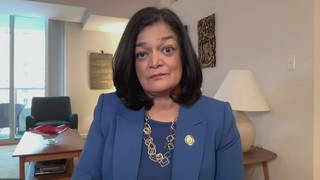
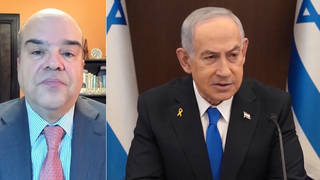
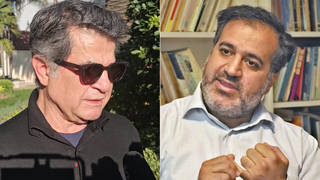
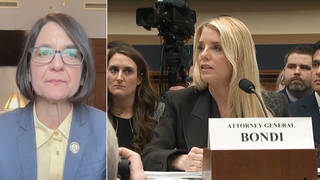





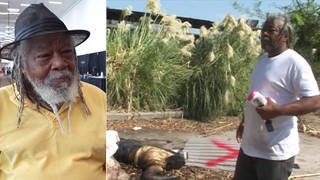

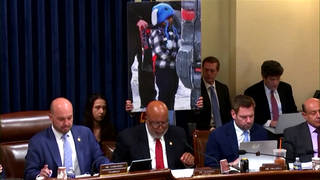
Media Options